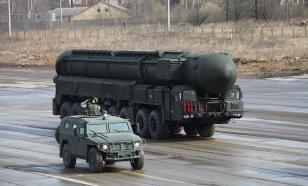Kyrgyzstan warns of radioactive catastrophe
Every spring in Kyrgyzstan gives rise to talk about the danger caused by harmful and dangerous wastes buried in the republic since the Soviet era. Several dozens of uranium deposits are located on the territory of Kyrgyzstan; each of them might casue a catastrophe similar to the one in the Ukrainian town of Chernobyl in 1986. This is the estimate of Kyrgyzstan’s ecological situation that was given by the Kyrgyzstan Legislative Assembly in an open letter to the CIS presidents.
The letter says that “Kyrgyzstan and the whole of Central Asia are under a deadly threat of radioactive pollution. The former shield of the Soviet Union may turn into a threat to the lives of millions of people at any time. Mercury, lead, uranium, and other dangerous substances are located in dozens of deposits in Kyrgyzstan. Uranium wastes cover the territory of over 6,000 hectares. Not to mention heavy metal dumps, the metals are accumulated in the human body and cause genetic changes. The burials are situated near settlements, villages where many people live, on the river banks, and on lakesides. In addition, burials are more frequently located in a 9-grade seismic zone. If the above-mentioned toxic substances get into rivers in Kyrgyzstan, they will inevitably spread all over Central Asia.”
The letter mentions the results of several scientific investigations in the regions of the Fergana valley: the mercury and stibium content in the soil is hundreds times above the norm. The concentration of poisonous elements in children’s organisms is even higher than in adults, unfortunately. This is because the Central Asian mining and metallurgical enterprises still use dangerous and out-of-date technologies in the production of mercury and stibium.
The Kyrgyzstan city of Kara-Balta is situated on an atomic bomb, literally. A commission revealed that 40 million cubic meters of wastes stored in the area radiate up to 15 microroentgen per hour, which is further spread via wind to the surrounding settlements.
Kyrgyzstan’s blue wonder, the lake of Issyk Kul, is under the threat of pollution as well. The lake’s crystal-clear water may turn into poison if the movement of radioactive elements to the coast is not stopped.
Deputies of the Legislative Assembly say that millions of dollars are required to prevent such disasters. Certainly, the republic does not have this kind money. Kyrgyzstan’s neighbors still treat the problems as internal problems of the republic.
Once again, deputies of the Kyrgyzstan parliament ask the CIS for help, as they think disasters can be stopped by common efforts only. Moreover, Central Asia already has the sad experience of the death of the Aral Sea. If a tragedy occurs in the Fergana valley, tens of millions of people will suffer.
Yury Razgulyayev PRAVDA.Ru Bishkek Kyrgyzstan Translated by Maria Gousseva
Read the original in Russian: http://www.pravda.ru/main/2002/04/29/40483.html
Subscribe to Pravda.Ru Telegram channel, Facebook, RSS!




